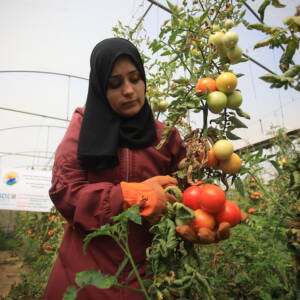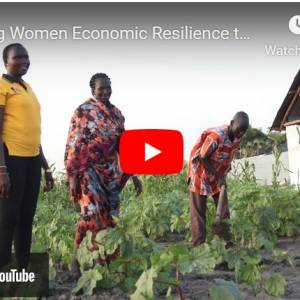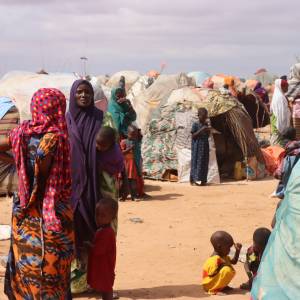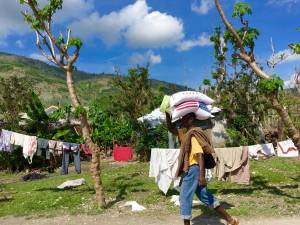Make A Donation
Click Here >
Posts Categorized: Famine
March 5, 2024
 By Eileen Schuhmann | Presbyterian Hunger Program The Presbyterian Hunger Program has been supporting its partner Improvement and Development for Communities Center (IDCO) in Gaza since 2014 in IDCO’s efforts to improve the food security situation for Gazans. Back in 2014, food insecurity levels in the Gaza Strip had already exceeded 57%, with more than 36% of Gazans being severely food… Read more »
By Eileen Schuhmann | Presbyterian Hunger Program The Presbyterian Hunger Program has been supporting its partner Improvement and Development for Communities Center (IDCO) in Gaza since 2014 in IDCO’s efforts to improve the food security situation for Gazans. Back in 2014, food insecurity levels in the Gaza Strip had already exceeded 57%, with more than 36% of Gazans being severely food… Read more »
March 13, 2023
 The Presbyterian Hunger Program’s partner Hope Restoration South Sudan has made this wonderful video about the work that PHP and the Presbyterian Disaster Assistance have supported there. The work of the Presbyterian Hunger Program is possible thanks to your gifts to One Great Hour of Sharing.
The Presbyterian Hunger Program’s partner Hope Restoration South Sudan has made this wonderful video about the work that PHP and the Presbyterian Disaster Assistance have supported there. The work of the Presbyterian Hunger Program is possible thanks to your gifts to One Great Hour of Sharing.
February 2, 2023
 Somalis abandon their homes in search of food, water and aid as drought deepens By Yusuf Abdirahman | Kaalmo Relief and Development, Somalia A devastating drought has displaced 1 million Somalis since January 2021, and more people are expected to flee as communities face the prospect of famine in 2023. First, the rains failed, then… Read more »
Somalis abandon their homes in search of food, water and aid as drought deepens By Yusuf Abdirahman | Kaalmo Relief and Development, Somalia A devastating drought has displaced 1 million Somalis since January 2021, and more people are expected to flee as communities face the prospect of famine in 2023. First, the rains failed, then… Read more »
December 9, 2022
 PHP is supporting partners in 11 of the 19 hunger hotspots identified by the FAO & WFP By Eileen Schuhmann | Presbyterian Hunger Program The United Nations Sustainable Development Goal of creating a world free of hunger by 2030 seems destined to fail as extreme hunger and food insecurity continue an upward trend. The Food… Read more »
PHP is supporting partners in 11 of the 19 hunger hotspots identified by the FAO & WFP By Eileen Schuhmann | Presbyterian Hunger Program The United Nations Sustainable Development Goal of creating a world free of hunger by 2030 seems destined to fail as extreme hunger and food insecurity continue an upward trend. The Food… Read more »
March 15, 2022
 Global partners persist in the face of chaos By Eileen Schuhmann | Presbyterian Hunger Program A few months into 2022, and looking back through 2021, the world has been affected by so many crises, each of them impacting people and the planet in unprecedented ways. But working with incredible partners in the middle of endless… Read more »
Global partners persist in the face of chaos By Eileen Schuhmann | Presbyterian Hunger Program A few months into 2022, and looking back through 2021, the world has been affected by so many crises, each of them impacting people and the planet in unprecedented ways. But working with incredible partners in the middle of endless… Read more »
January 20, 2021
 By Eileen Schuhmann | Presbyterian Hunger Program Just yesterday, on the Trump administrations way out, a new policy went into effect designating the Yemen Houthis as a “foreign terrorist organization.” The global community is concerned that this labeling of the Houthis as terrorists could lead to catastrophic famine in the country. For nearly 6 years,… Read more »
By Eileen Schuhmann | Presbyterian Hunger Program Just yesterday, on the Trump administrations way out, a new policy went into effect designating the Yemen Houthis as a “foreign terrorist organization.” The global community is concerned that this labeling of the Houthis as terrorists could lead to catastrophic famine in the country. For nearly 6 years,… Read more »
December 4, 2020
 Conflict escalation puts millions at risk of starvation By Mesk Alabsi | Generations without Qat, Yemen Yemen is experiencing the largest humanitarian crisis in the world and every day the situation grows worse. After nearly 6 years of war between the Houthis and a Saudi-backed military coalition, about 20 million people are suffering from food… Read more »
Conflict escalation puts millions at risk of starvation By Mesk Alabsi | Generations without Qat, Yemen Yemen is experiencing the largest humanitarian crisis in the world and every day the situation grows worse. After nearly 6 years of war between the Houthis and a Saudi-backed military coalition, about 20 million people are suffering from food… Read more »
February 7, 2020
 Boko Haram violence, severe food insecurity and U.S. travel ban By Eileen Schuhmann | Presbyterian Hunger Program Staff On January 18, a U.N. humanitarian facility in Ngala, Borno State, Nigeria, on the border with Cameroon, was violently attacked by non-state armed groups. The aid workers there were providing assistance to more than 55,000 people facing… Read more »
Boko Haram violence, severe food insecurity and U.S. travel ban By Eileen Schuhmann | Presbyterian Hunger Program Staff On January 18, a U.N. humanitarian facility in Ngala, Borno State, Nigeria, on the border with Cameroon, was violently attacked by non-state armed groups. The aid workers there were providing assistance to more than 55,000 people facing… Read more »
August 9, 2019
 The Presbyterian Hunger Program is prioritizing work on famine and extreme hunger By Eileen Schuhmann | Presbyterian Hunger Program The Presbyterian Hunger Program (PHP) is working to support grassroots organizations in Somalia, Yemen, South Sudan and Nigeria in their efforts to provide emergency food relief and rebuild livelihoods in communities faced with extreme hunger and… Read more »
The Presbyterian Hunger Program is prioritizing work on famine and extreme hunger By Eileen Schuhmann | Presbyterian Hunger Program The Presbyterian Hunger Program (PHP) is working to support grassroots organizations in Somalia, Yemen, South Sudan and Nigeria in their efforts to provide emergency food relief and rebuild livelihoods in communities faced with extreme hunger and… Read more »
July 19, 2019
 Without Urgent Humanitarian Intervention Famine Could Devastate Somalia Again By Eileen Schuhmann | Presbyterian Hunger Program The U.N. warned last month that all of the conditions are in place for famine to occur again in Somalia. Mark Lowcock, the under secretary general and emergency relief coordinator at the United Nations, says 2.2 million people could… Read more »
Without Urgent Humanitarian Intervention Famine Could Devastate Somalia Again By Eileen Schuhmann | Presbyterian Hunger Program The U.N. warned last month that all of the conditions are in place for famine to occur again in Somalia. Mark Lowcock, the under secretary general and emergency relief coordinator at the United Nations, says 2.2 million people could… Read more »
 By Eileen Schuhmann | Presbyterian Hunger Program The Presbyterian Hunger Program has been supporting its partner Improvement and Development for Communities Center (IDCO) in Gaza since 2014 in IDCO’s efforts to improve the food security situation for Gazans. Back in 2014, food insecurity levels in the Gaza Strip had already exceeded 57%, with more than 36% of Gazans being severely food… Read more »
By Eileen Schuhmann | Presbyterian Hunger Program The Presbyterian Hunger Program has been supporting its partner Improvement and Development for Communities Center (IDCO) in Gaza since 2014 in IDCO’s efforts to improve the food security situation for Gazans. Back in 2014, food insecurity levels in the Gaza Strip had already exceeded 57%, with more than 36% of Gazans being severely food… Read more »
 By Eileen Schuhmann | Presbyterian Hunger Program The Presbyterian Hunger Program has been supporting its partner Improvement and Development for Communities Center (IDCO) in Gaza since 2014 in IDCO’s efforts to improve the food security situation for Gazans. Back in 2014, food insecurity levels in the Gaza Strip had already exceeded 57%, with more than 36% of Gazans being severely food… Read more »
By Eileen Schuhmann | Presbyterian Hunger Program The Presbyterian Hunger Program has been supporting its partner Improvement and Development for Communities Center (IDCO) in Gaza since 2014 in IDCO’s efforts to improve the food security situation for Gazans. Back in 2014, food insecurity levels in the Gaza Strip had already exceeded 57%, with more than 36% of Gazans being severely food… Read more »
 The Presbyterian Hunger Program’s partner Hope Restoration South Sudan has made this wonderful video about the work that PHP and the Presbyterian Disaster Assistance have supported there. The work of the Presbyterian Hunger Program is possible thanks to your gifts to One Great Hour of Sharing.
The Presbyterian Hunger Program’s partner Hope Restoration South Sudan has made this wonderful video about the work that PHP and the Presbyterian Disaster Assistance have supported there. The work of the Presbyterian Hunger Program is possible thanks to your gifts to One Great Hour of Sharing.
 Somalis abandon their homes in search of food, water and aid as drought deepens By Yusuf Abdirahman | Kaalmo Relief and Development, Somalia A devastating drought has displaced 1 million Somalis since January 2021, and more people are expected to flee as communities face the prospect of famine in 2023. First, the rains failed, then…
Somalis abandon their homes in search of food, water and aid as drought deepens By Yusuf Abdirahman | Kaalmo Relief and Development, Somalia A devastating drought has displaced 1 million Somalis since January 2021, and more people are expected to flee as communities face the prospect of famine in 2023. First, the rains failed, then…  PHP is supporting partners in 11 of the 19 hunger hotspots identified by the FAO & WFP By Eileen Schuhmann | Presbyterian Hunger Program The United Nations Sustainable Development Goal of creating a world free of hunger by 2030 seems destined to fail as extreme hunger and food insecurity continue an upward trend. The Food…
PHP is supporting partners in 11 of the 19 hunger hotspots identified by the FAO & WFP By Eileen Schuhmann | Presbyterian Hunger Program The United Nations Sustainable Development Goal of creating a world free of hunger by 2030 seems destined to fail as extreme hunger and food insecurity continue an upward trend. The Food…  Global partners persist in the face of chaos By Eileen Schuhmann | Presbyterian Hunger Program A few months into 2022, and looking back through 2021, the world has been affected by so many crises, each of them impacting people and the planet in unprecedented ways. But working with incredible partners in the middle of endless…
Global partners persist in the face of chaos By Eileen Schuhmann | Presbyterian Hunger Program A few months into 2022, and looking back through 2021, the world has been affected by so many crises, each of them impacting people and the planet in unprecedented ways. But working with incredible partners in the middle of endless…  By Eileen Schuhmann | Presbyterian Hunger Program Just yesterday, on the Trump administrations way out, a new policy went into effect designating the Yemen Houthis as a “foreign terrorist organization.” The global community is concerned that this labeling of the Houthis as terrorists could lead to catastrophic famine in the country. For nearly 6 years,…
By Eileen Schuhmann | Presbyterian Hunger Program Just yesterday, on the Trump administrations way out, a new policy went into effect designating the Yemen Houthis as a “foreign terrorist organization.” The global community is concerned that this labeling of the Houthis as terrorists could lead to catastrophic famine in the country. For nearly 6 years,…  Conflict escalation puts millions at risk of starvation By Mesk Alabsi | Generations without Qat, Yemen Yemen is experiencing the largest humanitarian crisis in the world and every day the situation grows worse. After nearly 6 years of war between the Houthis and a Saudi-backed military coalition, about 20 million people are suffering from food…
Conflict escalation puts millions at risk of starvation By Mesk Alabsi | Generations without Qat, Yemen Yemen is experiencing the largest humanitarian crisis in the world and every day the situation grows worse. After nearly 6 years of war between the Houthis and a Saudi-backed military coalition, about 20 million people are suffering from food…  Boko Haram violence, severe food insecurity and U.S. travel ban By Eileen Schuhmann | Presbyterian Hunger Program Staff On January 18, a U.N. humanitarian facility in Ngala, Borno State, Nigeria, on the border with Cameroon, was violently attacked by non-state armed groups. The aid workers there were providing assistance to more than 55,000 people facing…
Boko Haram violence, severe food insecurity and U.S. travel ban By Eileen Schuhmann | Presbyterian Hunger Program Staff On January 18, a U.N. humanitarian facility in Ngala, Borno State, Nigeria, on the border with Cameroon, was violently attacked by non-state armed groups. The aid workers there were providing assistance to more than 55,000 people facing…  The Presbyterian Hunger Program is prioritizing work on famine and extreme hunger By Eileen Schuhmann | Presbyterian Hunger Program The Presbyterian Hunger Program (PHP) is working to support grassroots organizations in Somalia, Yemen, South Sudan and Nigeria in their efforts to provide emergency food relief and rebuild livelihoods in communities faced with extreme hunger and…
The Presbyterian Hunger Program is prioritizing work on famine and extreme hunger By Eileen Schuhmann | Presbyterian Hunger Program The Presbyterian Hunger Program (PHP) is working to support grassroots organizations in Somalia, Yemen, South Sudan and Nigeria in their efforts to provide emergency food relief and rebuild livelihoods in communities faced with extreme hunger and…  Without Urgent Humanitarian Intervention Famine Could Devastate Somalia Again By Eileen Schuhmann | Presbyterian Hunger Program The U.N. warned last month that all of the conditions are in place for famine to occur again in Somalia. Mark Lowcock, the under secretary general and emergency relief coordinator at the United Nations, says 2.2 million people could…
Without Urgent Humanitarian Intervention Famine Could Devastate Somalia Again By Eileen Schuhmann | Presbyterian Hunger Program The U.N. warned last month that all of the conditions are in place for famine to occur again in Somalia. Mark Lowcock, the under secretary general and emergency relief coordinator at the United Nations, says 2.2 million people could…